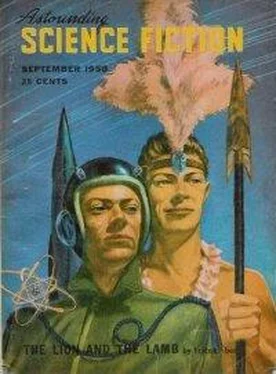William Morrison - The Sack
Здесь есть возможность читать онлайн «William Morrison - The Sack» весь текст электронной книги совершенно бесплатно (целиком полную версию без сокращений). В некоторых случаях можно слушать аудио, скачать через торрент в формате fb2 и присутствует краткое содержание. Год выпуска: 1950, Издательство: Street & Smith Publications, Inc., Жанр: Фантастика и фэнтези, на английском языке. Описание произведения, (предисловие) а так же отзывы посетителей доступны на портале библиотеки ЛибКат.
- Название:The Sack
- Автор:
- Издательство:Street & Smith Publications, Inc.
- Жанр:
- Год:1950
- ISBN:нет данных
- Рейтинг книги:3 / 5. Голосов: 1
-
Избранное:Добавить в избранное
- Отзывы:
-
Ваша оценка:
- 60
- 1
- 2
- 3
- 4
- 5
The Sack: краткое содержание, описание и аннотация
Предлагаем к чтению аннотацию, описание, краткое содержание или предисловие (зависит от того, что написал сам автор книги «The Sack»). Если вы не нашли необходимую информацию о книге — напишите в комментариях, мы постараемся отыскать её.
The Sack — читать онлайн бесплатно полную книгу (весь текст) целиком
Ниже представлен текст книги, разбитый по страницам. Система сохранения места последней прочитанной страницы, позволяет с удобством читать онлайн бесплатно книгу «The Sack», без необходимости каждый раз заново искать на чём Вы остановились. Поставьте закладку, и сможете в любой момент перейти на страницу, на которой закончили чтение.
Интервал:
Закладка:
The Sack
by William Morrison
At first they hadn’t even known that the Sack existed. If they had noticed it at all when they landed on the asteroid, they thought of it merely as one more outpost of rock on the barren expanse of roughly ellipsoidal silicate surface, which Captain Ganko noticed had major and minor axes roughly three and two miles in diameter, respectively. It would never have entered anyone’s mind that the unimpressive object they had unconsciously acquired would soon be regarded as the most valuable prize in the system.
The landing had been accidental. The government patrol ship had been limping along, and now it had settled down for repairs, which would take a good seventy hours. Fortunately, they had plenty of air, and their recirculation system worked to perfection. Food was in somewhat short supply, but it didn’t worry them, for they knew that they could always tighten their belts and do without full rations for a few days. The loss of water that had resulted from a leak in the storage tanks, however, was a more serious matter. It occupied a good part of their conversation during the next fifty hours.
Captain Ganko said finally, “There’s no use talking, it won’t be enough. And there are no supply stations close enough at hand to be of any use. We’ll have to radio ahead and hope that they can get a rescue ship to us with a reserve supply.”
The helmet mike of his next in command seemed to droop. “It’ll be too bad if we miss each other in space, Captain.”
Captain Ganko laughed unhappily. “It certainly will. In that case we’ll have a chance to see how we can stand a little dehydration.”
For a time nobody said anything. At last, however, the second mate suggested, “There might be water somewhere on the asteroid, sir.”
“Here? How in Pluto would it stick, with a gravity that isn’t even strong enough to hold loose rocks? And where the devil would it be?”
“To answer the first question first, it would be retained as water of crystallization,” replied a soft liquid voice that seemed to penetrate his spacesuit and come from behind him. “To answer the second question, it is half a dozen feet below the surface, and can easily be reached by digging.”
They had all swiveled around at the first words. But no one was in sight in the direction from which the words seemed to come. Captain Ganko frowned, and his eyes narrowed dangerously. “We don’t happen to have a practical joker with us, do we?” he asked mildly.
“You do not,” replied the voice.
“Who said that?”
“I, Yzrl.”
A crewman became aware of something moving on the surface of one of the great rocks, and pointed to it. The motion stopped when the voice ceased, but they didn’t lose sight of it again. That was how they learned about Yzrl, or as it was more often called, the Mind-Sack.
If the ship and his services hadn’t both belonged to the government, Captain Ganko could have claimed the Sack for himself or his owners and retired with a wealth far beyond his dreams. As it was, the thing passed into government control. Its importance was realized almost from the first, and Jake Siebling had reason to be proud when more important and more influential figures of the political and industrial world were finally passed over and he was made Custodian of the Sack. Siebling was a short, stocky man whose one weakness was self-deprecation. He had carried out one difficult assignment after another and allowed other men to take the credit. But this job was not one for a blowhard, and those in charge of making the appointment knew it. For once they looked beyond credit and superficial reputation, and chose an individual they disliked somewhat but trusted absolutely. It was one of the most effective tributes to honesty and ability ever devised.
The Sack, as Siebling learned from seeing it daily, rarely deviated from the form in which it had made its first appearance—a rocky, grayish lump that roughly resembled a sack of potatoes. It had no features, and there was nothing, when it was not being asked questions, to indicate that it had life. It ate rarely—once in a thousand years, it said, when left to itself; once a week when it was pressed into steady use. It ate or moved by fashioning a suitable pseudopod and stretching the thing out in whatever way it pleased. When it had attained its objective, the pseudopod was withdrawn into the main body again and the creature became once more a potato sack.
It turned out later that the name “Sack” was well chosen from another point of view, in addition to that of appearance. For the Sack was stuffed with information, and beyond that, with wisdom. There were many doubters at first, and some of them retained their doubts to the very end, just as some people remained convinced hundreds of years after Columbus that the Earth was flat. But those who saw and heard the Sack had no doubts at all. They tended, if anything, to go too far in the other direction, and to believe that the Sack knew everything. This, of course, was untrue.
It was the official function of the Sack, established by a series of Interplanetary acts, to answer questions. The first questions, as we have seen, were asked accidentally, by Captain Ganko. Later they were asked purposefully, but with a purpose that was itself random, and a few politicians managed to acquire considerable wealth before the Government put a stop to the leak of information, and tried to have the questions asked in a more scientific and logical manner.
Question time was rationed for months in advance, and sold at what was, all things considered, a ridiculously low rate—a mere hundred thousand credits a minute. It was this unrestricted sale of time that led to the first great government squabble.
It was the unexpected failure of the Sack to answer what must have been to a mind of its ability an easy question that led to the second blowup, which was fierce enough to be called a crisis. A total of a hundred and twenty questioners, each of whom had paid his hundred thousand, raised a howl that could be heard on every planet, and there was a legislative investigation, at which Siebling testified and all the conflicts were aired.
He had left an assistant in charge of the Sack, and now, as he sat before the Senatorial Committee, he twisted uncomfortably in front of the battery of cameras. Senator Horrigan, his chief interrogator, was a bluff, florid, loud-mouthed politician who had been able to imbue him with a feeling of guilt even as he told his name, age, and length of government service.
“It is your duty to see to it that the Sack is maintained in proper condition for answering questions, is it not, Mr. Siebling?” demanded Senator Horrigan.
“Yes, sir.”
“Then why was it incapable of answering the questioners in question? These gentlemen had honestly paid their money—a hundred thousand credits each. It was necessary, I understand, to refund the total sum. That meant an overall loss to the Government of, let me see now—one hundred twenty at one hundred thousand each—one hundred and twenty million credits,” he shouted, rolling the words.
“Twelve million, Senator,” hastily whispered his secretary.
The correction was not made, and the figure was duly headlined later as one hundred and twenty million.
Siebling said, “As we discovered later, Senator, the Sack failed to answer questions because it was not a machine, but a living creature. It was exhausted. It had been exposed to questioning on a twenty-four-hour-a-day basis.”
“And who permitted this idiotic procedure?” boomed Senator Horrigan.
“You yourself, Senator,” said Siebling happily. “The procedure was provided for in the bill introduced by you and approved by your committee.”
Читать дальшеИнтервал:
Закладка:
Похожие книги на «The Sack»
Представляем Вашему вниманию похожие книги на «The Sack» списком для выбора. Мы отобрали схожую по названию и смыслу литературу в надежде предоставить читателям больше вариантов отыскать новые, интересные, ещё непрочитанные произведения.
Обсуждение, отзывы о книге «The Sack» и просто собственные мнения читателей. Оставьте ваши комментарии, напишите, что Вы думаете о произведении, его смысле или главных героях. Укажите что конкретно понравилось, а что нет, и почему Вы так считаете.












